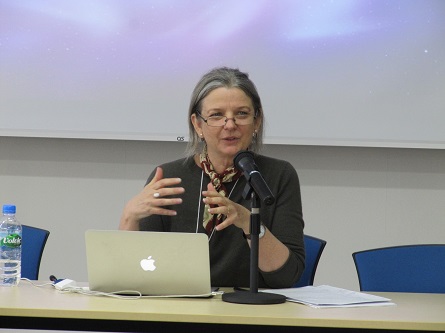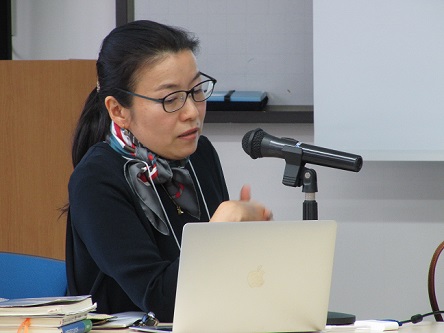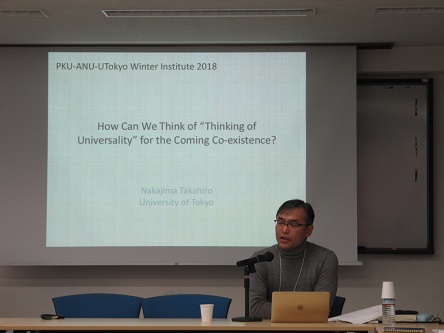【報告】 ANU-PKU-UTokyo Winter Institute 2018 (2)
The record-breaking snowfall on the 22nd resulted in massive delays in the Tokyo transit system, but that did not dampen the heated discussions during the sessions on the 23rd.

The day opened up with a lecture by Professor Nugent from ANU School of History, which was titled “Mistress of Everything? Queen Victoria, Indigineous Claims and the ‘New’ Imperial History.” Before embarking on a detailed discussion of how the representations and narratives of Queen Victoria circulated in the colonies, Professor Nugent highlighted some inherent questions when dealing with imperial or colonial histories, such as the place for someone not indigenous writing indigenous history, and how histories of the British empire could be told from the perspectives of those dispossessed by it. As a productive framework when dealing with these histories, Professor Nugent proposed an investigation into the network of relations or a web of associations, in other words, how ideas, concepts, objects travel around the British empire. This approach would destabilize the one-way street of metropole-periphery, and pave the way for a dialogical approach. Then, Professor Nugent introduced how the notion of Queen Victoria was translated using the language of affect, such as “love”, “fealty” and “loyalty” in the colonies, which resulted in a three way relationship between the indigenous community, the local settler authorities and the distant humanitarian Queen, who was perceived as being interested in the welfare of the indigenous peoples. It was highlighted that there are multiple levels of meaning embedded in the indigenous story-telling of Queen Victoria, yet these materials are transmitted orally and is not recorded. Moreover, the motif of “the deeds to the land that were lost” are repeated in these stories, which demonstrate the importance of the documents that are missing or lost in the colonial archive.
In the group discussion that followed, the downsides of “New Empire Studies” as well as Bruce Gilley’s withdrawn article “The Case for Colonialism” sparked heated debates from the floor. Other topics that were discussed were the notion of shared sovereignty as an alternative to the triangular structure in colonial narratives, as well as the possibility of a “global indigenous politics” that investigate various communities of indigenous people beyond the framework of the state. Issues surrounding history and memory was also raised, since writing history is an inherently political act. Similarly to Professor Ishii’s point raised in the previous day, the recorder has a moral responsibility when writing and producing histories.

The first of the two afternoon lectures was “Naming the Un-nameable: Comparing Political Experiences of Burakumin in Japan and Dalits in India”, delivered by Professor Ikegame of University of Tokyo’s Institute for Advanced Studies on Asia. Professor Ikegame juxtaposed the experiences of the two former ‘untouchable’ communities to highlight how comparisons of two different areas will reveal aspects that cannot be discovered from a study of a sole area. Although the two communities are similar in their political experiences and the fact that the discrimination is still not eradicated, they differ in respect of their percentage within the total national population and whether or not there is an official quota system. Through tracing the changing discourse regarding Burakumin from the end of the nineteenth century to the latter half of the twentieth century, it was revealed that the persisting issues surrounding Buraku are due to how the community is identified using geographic location as well as how the notion of “dowa (assimilation)” was forced upon the community by the state, as opposed to the comparatively humane notion of “harmony.” Professor Ikegame closed her presentation with the Tottori Loop Incident as an example of how the issue still persists in the contemporary era, and emphasized how issues related to minorities are often thought to belong only to the minority community themselves, but in fact it should be taken into consideration as everybody’s issue.
The discussion session that followed revolved around the notion of names, as well as spatiality. Some of the notions that were discussed was how the act of “naming names” or “revealing names” could be a violent act, or how changing one’s name could be a strong political statement. Moreover, in connection to the idea of assimilation, how the space the community inhabited was transformed into a homogenous space in line with the rest of the city was also raised.

The final lecture of the day was Professor Nakajima’s titled, “How Can We Think of ‘Thinking of Universality’ for the Coming Coexistence?” Professor Nakajima began by highlighting Leibniz’s attempt to overlap the indigenous li and Xiandi with Western thinking and reveled that what was at stake for Leibniz when he considered China in relation to universality was the issue of translation. Leibniz had to grapple with the different concepts for universality such as li and Xiandi, which are not stable concepts in which the meaning of the words are constantly transforming. In other words, a mutual transformation of concepts occurs during the process of translation. Following the discussion on Leibniz, how the notion of universality had been theorized in modern East Asian thought was explored, starting with the concept of “translative universality” that transforms both the East and West simultaneously that features in Takeuchi Yoshimi’s Asia as Method. After the inherent weakness of the notion of absolute universality in Koyama Iwao’s The Philosophy of World History was raised, the focus shifted to the notion of Tian-xia (all-under-heaven) as an example of Chinese universality that was first proposed by Zhao Tingyang. Following Zhao’s ideas on all-under-heaven, Xu Jilin’s new notion of “shared universality” was introduced, as well as Baik Yeong-seo’s criticism and alternative framework of “communicative universalism” that stems from an emphasis on peripheral perspectives. Professor Nakajima concluded his lecture by raising the notion of earthly or horizontal universality through exploring the theories of thinkers associated with spirituality, such as DT Suzuki and Swami Vivekananda.
During the discussion, Professor Nakajima emphasized how translated values are not consumable or commodifiable, contrary to commodified notions such as Cool Japan. Notions such as “universality” and “universalizing” proposed by François Jullien, as well as Robert Bellah’s “ethical modernity” also featured in the discussion. In addition, the danger of the fluid discourses were also raised in respect to historical and political understandings.
By Erin Kitagawara (Interdisciplinary Cultural Studies/GPEAK D1)






